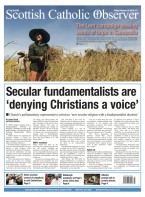February 16 | ![]() 0 COMMENTS
0 COMMENTS ![]() print
print
Gender change plans could ‘fail children’, Church says
Proposals to change the law on gender identity could ‘seriously fail’ children, the Catholic Church has said in a submission to the Scottish Government
The Church questioned children’s ability to ‘understand the momentous decision to change gender,’ in their response to an ongoing consultation into altering the Gender Recognition Act 2004.
At present, people may obtain certificates of new gender recognition under the act if they are medically diagnosed as having ‘gender dysphoria’ and have ‘transitioned’ into a gender of their choice for at least two years. In their submission, the Church said the ‘suffering of those with gender dysphoria must be taken seriously and they must receive all necessary support, including support with their mental health, from healthcare professionals.’ The submission said statistics form the Diagnostic and Statistical Manual of Mental Disorders show persistence of gender dysphoria at between 2.2 and 50 per cent and said these ‘relatively low’ overall rates should be taken seriously by the Scottish Government.
“Allowing children and young people to legally change their gender when the likelihood is that they will or might well be reconciled with their birth gender in the long term seriously fails the child,” it said.
“The lives of children of this age are fraught with much confusion and vulnerability—even in matters of sexual orientation and sexual identity—is it appropriate to entertain the possibility of allowing an underage child to legally change their gender?” it asks.
The submission said that for the sake of the common good, ‘gender cannot be reduced to a mere construct that is fluid and changeable,’ and that we are required to be ‘unwavering in love and acceptance of those who experience gender dysphoria.’
It added that the ‘rights of conscience and freedom of religion’ for those ‘who do not subscribe to the idea that gender is fluid,’ must be protected, particularly for healthcare workers, marriage celebrants, and religious representatives.
In a seperate submission, The Anscombe Centre for Bioethics in England warned that children will be at increased risk of harm under proposed changes to the law.
The February 9 briefing paper from the Anscombe Centre said there was evidence that, ‘with the onset of puberty, most children with gender dysphoria come to identify as the gender congruent with their birth sex.’
“We are concerned that young people under 18 and even under 16 might be invited to make a permanent change to their legal status via a mere self-declaration on a question as fundamental as gender identity,” the document said.
Anthony Horan, director of the Catholic Parliamentary Office, said the Catholic Church opposed the philosophy underpinning the proposed reforms because it presented gender not as a biological fact but as ‘a mere construct of society that is fluid and changeable.’
“Gender dysphoria continues to be recognised as a genuine, troubling medical condition,” Mr Horan told the Catholic News Service. “By moving to a self-declaratory model and de-medicalising the wish to transition legally, we may fail to provide the necessary support for those affected by gender dysphoria in the form of contact with health professionals.”











